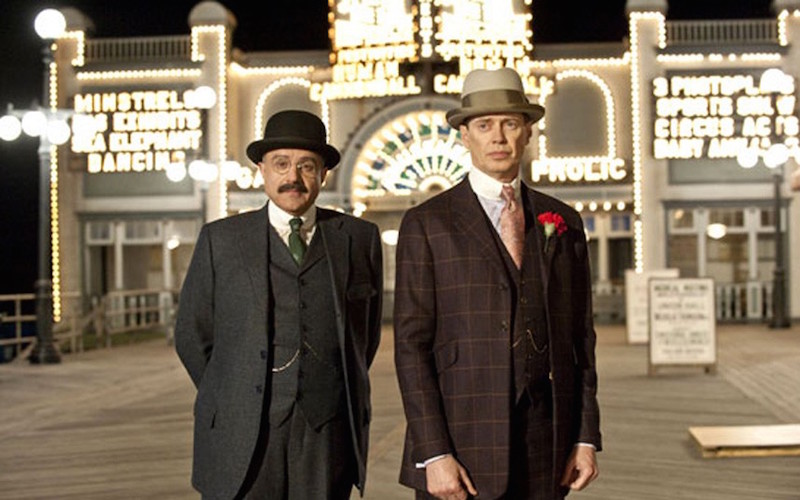From Stage to Screen: Lunch with Anthony Laciura
Gone is the gray mustache, round-rimmed glasses, and coarse German accent from Anthony Laciura’s award-winning performance on five seasons of HBO’s Boardwalk Empire. His transition from stage to screen was a new experience for Laciura, whose extensive career as a world-renowned opera singer has brought him to the stage of the Metropolitan Opera more than 800 times in over 50 shows, as well as singing with all three tenors. Terrance McNally of the New York Times deemed him, “One of the outstanding character-tenors of our time”. It is Laciura’s refined acting skills, however, that allowed him to make the move to television.
Was it difficult transitioning from performing in front of a live audience on stage to a television/film studio?
It’s different, but equally enjoyable. When shooting film, there is no immediate feedback that a live audience imparts. You may shoot the same scene thirty times in a row so it can be captured from a variety of angles and perfected from each angle before they go to the editing room and piece it together. In film, gestures must be minimized, and you must allow the emotion in your speaking voice to create the expressions on your face. It’s a completely different kind of acting. You’re performing for that little bitty camera as opposed to live in front of 4,000 people, so you must find the music in the text and how to deliver the emotion only through speaking.
How did you land the role of Eddie Kessler in HBO’s Boardwalk Empire?
Originally, Martin Scorsese’s office was looking for a character called Big Jim Colosimo. In real life, Colosimo was a very large Italian man whose personality was also bigger than life. They called my manager and he described me to them. I didn’t fit the description of Big Jim Colosimo, but they thought I may be a good fit for the role of Eddie Kessler. Eddie’s character was a loyal, old-world German, who was extremely precise and endlessly dedicated to his employer.
I arrived to audition in a three piece suit and with a beard, just as I thought the character may require. I walked in to the audition room and up to the women behind the casting table, kissed their hands, and said in my best German accent, “ I am very nervous because this is a very important audition for me because I have…” I took a deep breath, “Martin Scorsese is probably the greatest film director…I am…phew…very…I stutter sometimes because I am trying to translate from the English, but I hear you and am translating into the German so I can understand what to say and so I…whoa…I take a deep breath and try to calm down.” Then, Ellen, the casting director for most of Scorsese’s films, asked what part of Germany I was from. I looked at her, smiled, and said in my regular voice, “The South Bronx.”
After you first signed on as Eddie Kessler, did you know that they were going to have you sing?
They knew my background and so singing did evolve in two episodes. I got to sing for the Mayor’s birthday and later, another German drinking song in the bar. They asked me to find a German song for the Mayor’s birthday so my friend Karl and I came up with the pig farmer’s song from The Gypsy Baron. The singing I did for Boardwalk Empire was completely different than singing opera at the Met, though. Instead of singing at my best, I stayed in character and attempted to sound like an older man where singing was not his profession. Also, the music is pre-recorded, then mouthed while filming.
Eddie Kessler’s character is based off of a real person, Louis Kessel. How much research did you do beforehand and is it the same type of research you do for an opera?
The research is similar, but a little more in depth for film. I became very close with Lou Kessel’s family. Lou Kessel was my height, 5’6”, but he was 240 pounds. He was a wrestler, had bear hands, and spoke with a heavy Yiddish accent. In the show, I spoke in a German accent as opposed to Yiddish, as it came across more clearly.
In a scene in Boardwalk Empire, Nucky (played by Steve Buscemi) asks Eddie to help him open a door and get Lucy out. Lou Kessel would have pulled the thing right off the hinges, grabbed her, and put her on the bed, followed by asking in a Yiddish accent, “You want something else?” My interpretation of Eddie in this scene and my character in general was a contrast to this, and a collaborative effort between the creative team and me. While based on Kessel, Eddie didn’t need to be Kessel in entirety. If I had been hired to play Al Capone or Arnold Rothstein in a documentary, the research and embodiment of the character would have been more true to life.
Do you think that taking theater classes would be beneficial for singers?
Without question, definitely. I teach a course called Acting for Singers where I show my students how to move and embody a character. How one holds or uses a prop completely differs by character. For example, there are lots of ways to sit in a chair. How you approach and sit in the chair won’t be the same if you are old or if you are a kid. And if you’re a baby, you’ll crawl up to the chair, circle it, and sit just like a cat. In the same breath, I also teach actors how to sing, even if an actor has no aspirations to be in a musical. Learning proper singing technique will support the actor’s speaking voice on screen, and give the actor a better sense of the sound and emotion they create with their voice.
Is there any advice you would give young singers?
You must have a strong, solid technique. I’ve unfortunately come across many voice teachers who are instructing their clients to belt without that support. In the long run, your vocal chords need proper technique in order to remain healthy. If you want longevity in this business, and want to increase your range and be able to sustain it, learning and implementing proper technique is essential. This is an ongoing process, and the reason people hire vocal coaches. Once that is established on a consistent basis, young people need to understand that keeping their bodies healthy will help to keep their voice healthy. Smoking, excess drinking, and junk food should be avoided. Be in tune with what affects your voice; for some singers it’s dairy, for others it’s spicy foods. Don’t yell. Rest your voice when you can. Your voice is like a fingerprint – it’s unique to you, and you want to always treat it with care.








